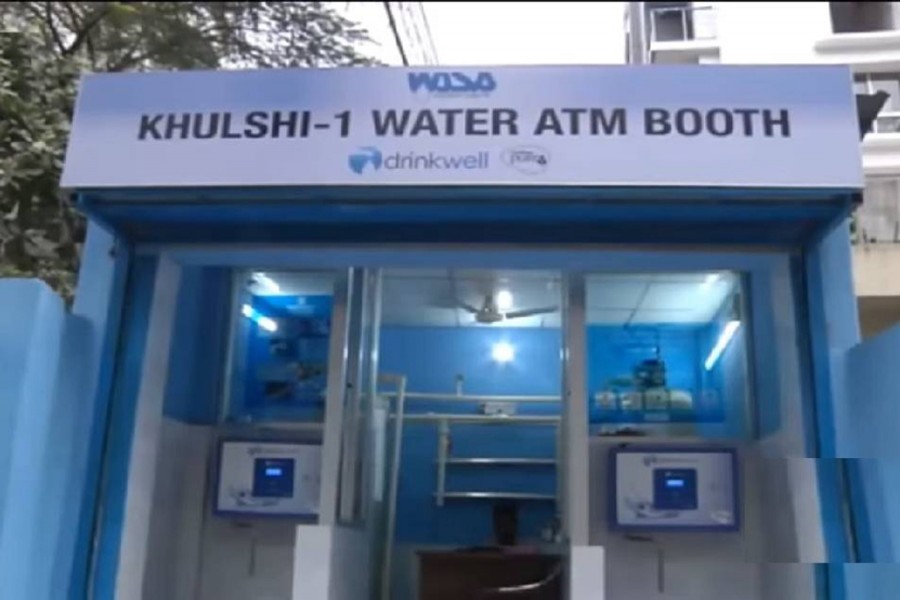As the metropolitan Dhaka's population continues to rise unabated, a vital aspect keeps becoming evident. The city miserably lacks lots of basic civic amenities. In the absence of many public utility services, its identity as a 'metropolis' finally proves an exercise in meaningless self-glorification.
Starting from the movement along footpaths and on roads to survival in an atmosphere free of pollution, almost every sphere of life in Dhaka is filled with annoyance and a feeling of repulsion. The sufferers belong to all social classes. They include the poorer, the lower-middle and middle classes and the affluent people. But when it comes to day-to-day utilities, it is the poor and lower-middle classes who suffer the most.
Against this backdrop, the launch of ATM booths for purchasing safe drinking water at a nominal price carries the elements of becoming big news. The city's people living in areas perennially hit by water crisis are expected to heave a sigh of great relief over the facility. The project has been introduced by Dhaka Water Supply and Sewerage Authority (DWASA). In the last couple of months after its opening in different parts of the country, the government agency has received warm, spontaneous response from people long suffering from the paucity of drinking water. All the water clients have to do is buy a prepaid card at Taka 50. They can collect the water in their own containers by using the card. At the booths one litre water costs 40 paisa only. For the same quantity of water filled and sealed in bottles sold at shops, one has to pay Tk 20. Most of the people buy large quantities of ATM water at a time, which they are told will keep them free of water-borne diseases. Normally, the WASA water they collect from taps in the water crisis-hit areas is mostly discoloured and filled with stench. Not to speak of drinking, people do not even wash rags with this supply-water.
That the DWASA's drinking water project would become popular in areas suffering from water crisis year after year was predictable. In the dry seasons, especially during the scorching summer, residents in Dhaka's water-scarce areas are seen getting desperate for availing just clean and odour-free water. Pure drinking water remains a far cry.
According to many, Dhaka badly needs such water points in the worst-hit areas. At the moment, Dhaka WASA is running ATM booths in Fakirapul, Mugda and Lalbagh areas. Authorities have plans to increase the number of these booths to around 300 in the water crisis-hit areas, close to WASA water pumps, across the capital. The Chittagong and Khulna water supply authorities have also started these booths in cooperation with the US-based entity Drinkwell.
Selling drinking water through prepaid cards is not unique to Dhaka. Many developed countries, especially the US, have this system in place. The clients in a US state had a few years ago had to stop drinking tap water due to the excessive presence of a purifying agent. The water was declared harmful for human consumption.
In the case of Bangladesh, purchasing water from ATM booths has been necessitated by the WASA's inability to supply clean drinking water to the city residents. Now that the new system will keep replicating in larger parts of the city, Dhaka can claim itself to be called a city of fresh drinking water. In reality, it was so 30/40 years ago.
That before drinking supply-water or using it for household works, one is required to boil it was an alien idea back then. Almost every family in the city would be found drinking or using the raw WASA water that came through the pipes. Drinking water without boiling it is nowadays an appalling thought for the health-conscious people in the capital. Researchers have found the existence of scores of hazardous bacteria in the water supplied by the government agency. The distressing fact is a large number of Dhaka residents are aware of this grim reality. Yet many do not bother to boil the drinking water.
The WASA authorities acknowledge their limitations that stand in the way of supplying fresh water to the whole metropolis. They have been saying for long that their underground pipes have become worn-out owing to overuse. At the same time, they point the finger at the galloping number of Dhaka's population underscoring their incapability to cater to the fresh water demands of all the residents. In an adverse situation like this, the project of selling pure water to people for a token price might seem a solution.
Meanwhile, human rights groups have raised a tricky point. As they have viewed it, it is a duty on the part of WASA to provide fresh water to its clients; but they have embarked on a commercial venture. In fact, a major problem lies with the dreaded corruption and irregularities that beset the utility service-providing government agencies. In the case of water sold at cheaper prices through prepaid cards, the scourges of corruption and irregularities cannot be ruled out. It may begin with the hoarding of this water, and selling it later at higher price.
Human rights activists have raised their voice on a genuine ground. But there is an irony. With no permanent solution to the water crisis in sight, the WASA clients may not be deterred from buying fresh water from the booths. It can, at least, ensure the product for them, albeit at a price, especially in the season of scorching summers. The season emerges as a punishing time for the Dhaka dwellers in vast areas. To add to the commoners' woes, a fresh rise in the water tariff may throw the city people in a state of great inconvenience. In spite of the genuine objections raised by the human rights activists, the general people have no way out before them except turning to the booths, at least for now.


